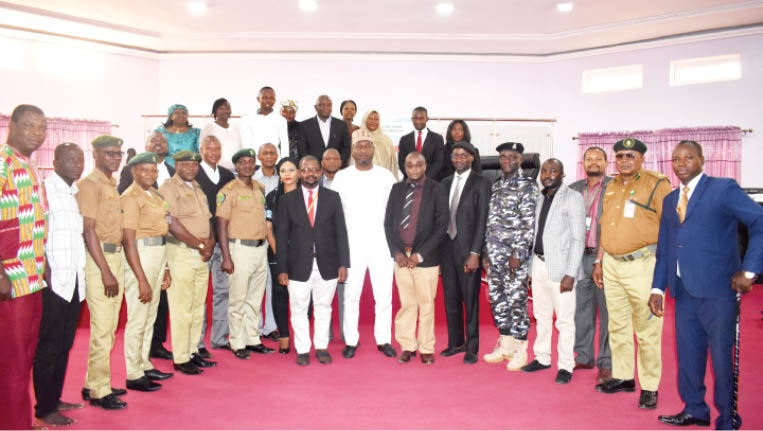Experts decry corruption, impunity, lack of accountability in prisons
Criminal justice stakeholders in Nasarawa State have decried the level of corruption and impunity afflicting the criminal justice system in the country. It was agreed that the high level of impunity at the pre-trial stage of the criminal justice process has a great impact on the subsequent stages of criminal justice and actors. This was […]

Participants at the criminal justice programme in Nasarawa State recently
Criminal justice stakeholders in Nasarawa State have decried the level of corruption and impunity afflicting the criminal justice system in the country.
It was agreed that the high level of impunity at the pre-trial stage of the criminal justice process has a great impact on the subsequent stages of criminal justice and actors.
This was part of the revelations at the just concluded Summit on Justice Reforms and Human Rights in Lafia, Nasarawa State on December 13.
Those in attendance were officials of the Nigeria Police, Nigeria Prisons Service, National Human Rights Commission (NHRC), Legal Aid Council, Citizens United for the Rehabilitation of Errants (CURE), Ministry of Justice, Source of Hope Foundation and Nasarawa State High Court, among others.
The theme of the summit was ‘The Role of Human Rights and the Rule of Law in the Administration of Criminal Justice and Prison Decongestion in Nasarawa State’.
In his speech, the Executive Director of CURE, Sylvester Uhaa, called on all arms of the criminal justice system to comply with the provisions of Section 293 of the Administration of the Criminal Justice Act, 2015 “which provides for a detention time limit of 56 days and Section 35(4,5) of our 1999 Constitution which provides detention time limit of 24 and 48 hours to eliminate prolonged pre-trial detention in Nigeria and respect human rights and the rule of law.”
Uhaa decried congestion in the Nigerian prisons and the poor treatment of prison inmates.
“Of the over 70,000 prisoners in Nigeria, more than 50,000 are awaiting trial, representing over 70%, making Nigeria the fifth country with the highest awaiting trial population in Africa, trailing Libya, DRC, Central African Republic and Benin Republic,” he said.
In drawing a correlation between poverty and criminality in the society, he cited the recent United Nations reports confirmed by the Federal Government “that out of the 500 million illegal arms and light weapons in West Africa, a whopping 350 million, representing 70% are in Nigeria. This explains the unprecedented rise in crime, violence and killings across the nation.”
Also speaking, the Nasarawa State Controller of Prisons, Patrick Dalyop, said the service spends N818,550 daily to feed 1,819 inmates across the six prisons in the state.
Dalyop, represented by ACP Rabiu Ibrahim, decried the level of congestion in prisons across the state.
He disclosed that the state’s six prisons had a carrying capacity of only 908 inmates, but currently housed 1,819 inmates, adding that each inmate is fed with N450 daily.
The Nasarawa State Coordinator, NHRC, Nor Chia-Shaku, urged stakeholders to embrace alternative conflict resolution mechanism to decongest the courts and prisons in the State.
Chia-Shaku also said that alternative conflict resolution mechanism was an integral aspect of the criminal justice reform.
Also, the Chief Judge of the state, Justice Suleiman Dikko, said the judiciary in the state had taken far-reaching measures towards speedy dispensation of justice aimed at decongesting prisons.
Dikko said the CJ had directed lower courts to reject cases beyond their jurisdiction and as a result has eliminated holding charge in the state, and directed magistrates to conduct regular prison visits to release inmates that were wrongly detained.
Speaking, Michael Ugoh, who represented the State Coordinator, Legal Aid Council, lamented poor funding and lack of logistics, saying they have no vehicle and that the N41,000 monthly allocation to the council was paid regularly.
He said LAC in Nasarawa had only 10 staff, which are far too inadequate to provide for the needs of the teeming indigent detainees without lawyers. He called on the state government to come to their aid so that they can improve their service delivery.
